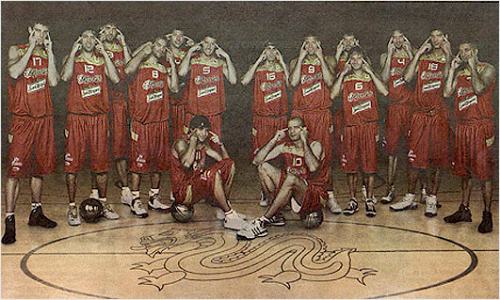August 14, 2008
Written by C.N.
Spain Basketball Team’s Racist Gesture
Several Asian American bloggers (thanks to AngryAsianMan for first pointing it out) and now, major news organizations such as ABC News and the New York Times, have been covering this emerging controversy: Spain’s Olympic basketball team making a racist, anti-Asian gesture before the start of the games:

A pre-Olympics “slant-eye” pose by the Spanish men’s basketball team could leave the gold medal contenders with a black eye as they compete in Beijing. . . .It’s a racially pejorative pose not often associated with goodwill in the United States and many other countries, where a similar gesture is more likely to be seen on a school playground than coming from Olympic statesman.
“It’s something that I haven’t seen since I was a kid,” said Sarah Smith, a spokesman for the Organization of Chinese Americans in Washington, D.C. “I can’t speak for what is considered funny in Spain. I don’t know if it has the same impact that it would here. It’s clearly racist, and not even in a jovial way.” . . .
This is not Spain’s first racial controversy involving sport. In 2004, FIFA, the world ruling body in soccer, fined the Spanish Football Federation nearly $90,000 after Spanish fans showered black English players with racist chants during a “friendly” match in Madrid.
The governing body for Formula One auto racing announced in April an anti-racism campaign after British driver Lewis Hamilton, who is black, was racially taunted by racing fans in Madrid. A group, wearing dark makeup on their faces, wore shirts that read “Hamilton’s Family.”
As any Asian American will tell you, this “chink eye” gesture is deeply hurtful and offensive to us. Many of us have experienced the pain and humiliation associated with this racist gesture throughout our entire lives, whether it’s in the playground of our elementary school, or as we walk down the street even as adults. For Asian Americans, it is the visual equivalent of being called a “nigger.”
With that in mind, as the ABC News article mentions, this is not the first time that Spain has been in the news for making racially offensive gestures. While I cannot make a blanket generalization about the racial sentiment of the Spanish people in general, I can say that combined with the previous soccer and Formula One/Lewis Hamilton episodes, this “chink eye” incident does not reflect well on the country.
At the same time, for the sake of argument, I can accept that in this specific circumstance, Spain’s basketball team did not intend this “gesture” to be ridiculing or offensive to the Chinese or Asians in general. For now, I am willing to accept that they were not aware of the cultural meaning of this gesture for Asians and Asian Americans.
But unfortunately, this “lack of awareness” is at the heart of the problem and in fact, forms the basis for much of the racism that Asians and Asian Americans encounter on an everyday basis. In other words, most non-Asians (most of whom are admittedly White) don’t purposely intend to be racist when make jokes or casual comments about Asians.
But when they do so based on their ignorance of Asians and Asian Americans, they only reinforce and perpetuate their racial privileges as Whites. In other words, because Whites are the demographic and cultural majority in the U.S. (and in Europe), they have the privilege of not having to think about their racial superiority — it’s a given, based on their country’s history.
That privilege also gives them the “right” to not have to worry about saying or doing offensive things about other racial groups because basically, who cares about Asians? That is, their racial privilege gives them a larger “comfort zone” to say and do things that they think are funny or harmless but ultimately, minorities find very offensive.
Even if most Whites don’t have this consciously or even unconsciously in their minds when it comes to Asians, this climate of racial ignorance is a reality and functions to “protect” and “insulate” Whites — whether or not they’re even aware of it — at the expense of people of color.
Of course, many Whites will respond by basically saying that even if the Spanish basketball team meant it as a joke, Asians should just shrug it off, that it was harmless and that we Asians should just lighten up and not take things so seriously.
The problem with that argument is that it ignores the larger historical and cultural context. What we need to recognize is that there are fundamental institutional power differences inherent in situations in which Whites denigrate minorities.
Each time an incident like that happens, it reinforces the notion of White supremacy — that Whites can say and do whatever they want toward anybody at any time without facing any negative repercussions.
Ultimately, suggesting to us that we should just “get over it” only serves as another clear illustration of White privilege — of those with in an institutionally superior position telling those below them what to do and what they should think.
Within this larger sociological context, the Spanish basketball team’s gesture, unfortunately, is really nothing new.

